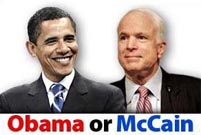Pact between Obama, McCain campaigns on TV debates
New York, Sep 22 :  The Obama and McCain campaigns have agreed to an unusual free-flowing format for the three televised presidential debates, which begin on September 26, but the McCain camp fought for and won a much more structured approach for the questioning at the vice-presidential debate.
The Obama and McCain campaigns have agreed to an unusual free-flowing format for the three televised presidential debates, which begin on September 26, but the McCain camp fought for and won a much more structured approach for the questioning at the vice-presidential debate.
Obama won an agreement for the first debate to be about foreign policy and national security on Friday, The New York Times reported.
At the insistence of the McCain campaign, the October 2 debate between Republican nominee for vice president Governor Sarah Palin and her Democratic rival Senator Joseph R. Biden Jr., will have shorter question-and-answer segments than those for the presidential nominees, the advisers said.
There will also be much less opportunity for free wheeling, direct exchanges between the running mates, the paper said.
McCain advisers said they had been concerned that a loose format could leave Palin, a relatively inexperienced debater, at a disadvantage and largely on the defensive.
The wrangling was chiefly between the McCain-Palin camp and the nonpartisan Commission on Presidential Debates, which is sponsoring the forums.
Commission members wanted a relaxed format that included time for unpredictable questioning and challenges between the two vice-presidential candidates.
On Wednesday, the commission unanimously rejected a proposal sought by advisers to Palin and McCain to have the moderator ask questions and the candidates answer, with no time for unfettered exchanges. Advisers to Biden say they were comfortable with either format.
Both campaigns see the four debates as pivotal moments in a presidential race that is not only extraordinarily close but also drawing intense interest from voters; roughly
40 million viewers watched the major speeches at the two parties’ conventions.
A commission member said that the new agreement on the vice-presidential debate was reached late Saturday morning. It calls for shorter blocks of candidate statements and open discussion than at the presidential debates.
McCain advisers said they were only somewhat concerned about Palin’s debating skills compared with those of Biden, who has served six terms in the Senate, or about his chances of tripping her up.
Instead, they say, they wanted Palin to have opportunities to present McCain’s positions, rather than spending time talking about her experience or playing defense.
While the debates between presidential nominees are traditionally the main events in the fall election season, the public interest in Palin has proved extraordinary, and a large audience is expected for her national debate debut.
Indeed, both the McCain and Obama campaigns have similar concerns about the vice-presidential matchup in St. Louis: that Palin, of Alaska, as a new player in national politics, or Biden, of Delaware, as a loquacious and gaffe-prone speaker, could commit a momentum-changing misstep in their debate.
The negotiations for the three 90-minute debates between the men at the top of the tickets were largely free of brinksmanship. Neither side threatened to pull out, and concerns about camera angles and stagecraft were minor. (ANI)